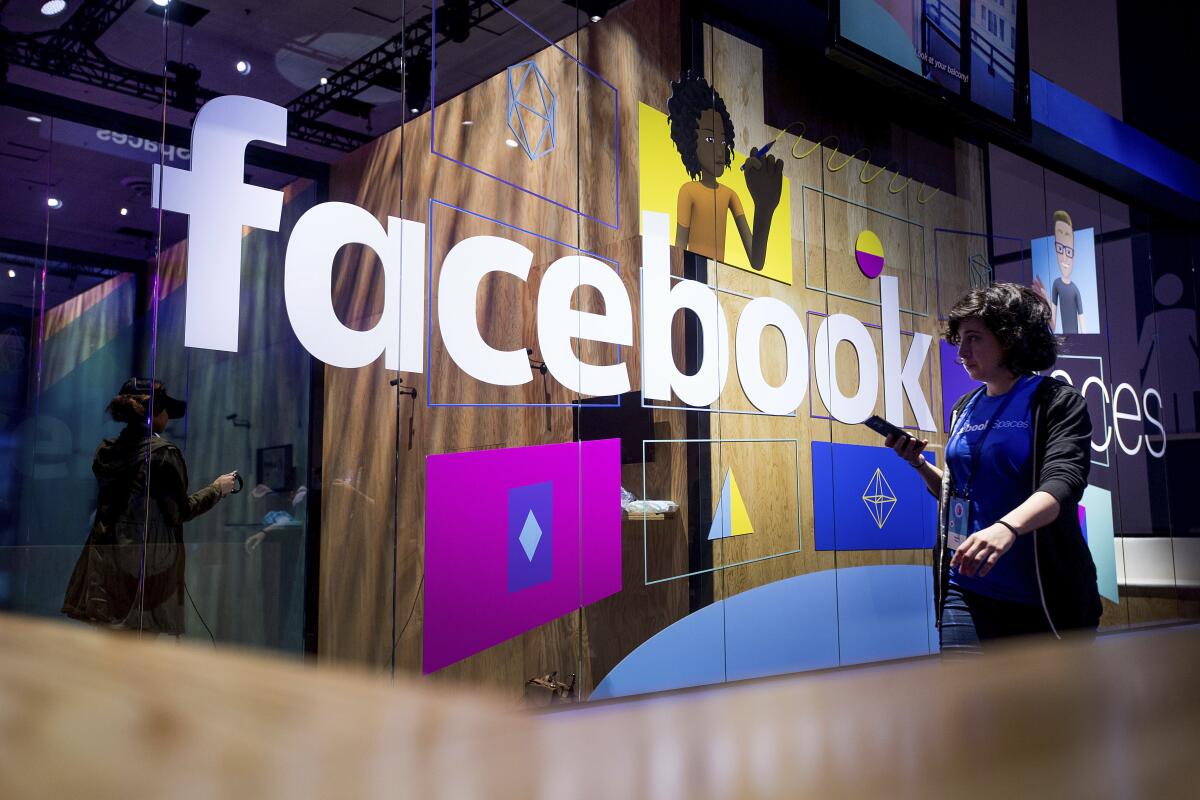Facebook is too big. Breaking it up is just part of the solution

- Share via
The Federal Trade Commission and the attorneys general of 46 states filed lawsuits Wednesday seeking what amounted to a do-over on Facebook — the chance to reject two acquisitions that helped make the social network the behemoth it is today.
Those acquisitions — the $1-billion purchase of the mobile picture-sharing network Instagram in 2012 and the $19-billion purchase of the messaging service WhatsApp two years later — absorbed fledgling companies that had threatened to draw users away from Facebook. Yet the FTC initially approved both mergers, and the states did not try to stop them at the time they were announced.
Facebook will probably make hay out of those approvals as the case moves forward, but this is more than an exercise of 20/20 hindsight. The state and FTC lawsuits allege that the purchases fit into a troubling pattern of steps by Facebook to buy up or beat down rivals. Those allegations, based on documents and other evidence gathered by state and federal investigators, speak to the kind of anti-competitive tactics that might be ignored in a start-up but can’t be countenanced in a market-leading firm.
Today, Facebook is not only the largest social network on the planet by far, it may have the largest customer base — 2.7 billion users, according to data compiled by the website Statista — of any company of any kind. Granted, its size alone does not make Facebook a monopoly. And in some respects, its phenomenal reach and penetration has been a boon to the public, allowing people to find and stay in touch with far-flung friends and associates while giving advertisers access to a global market of potential customers.
But in recent years, the dark side of Facebook’s popularity and dominance have become more apparent. Among other noxious pursuits, the social network has been used to incite violence, spread disinformation, vacuum up personal information, manipulate voters and sow division — problems Facebook has acknowledged, yet has been unable to eliminate. That’s due in large part to the sheer scale of the network.
In fact, Facebook has drawn new complaints as it has tried to cut down on the fake news, conspiracy theories and violent and extremist content spread across its network. Among other things, it’s been accused of blocking too much or too little content posted by conservatives and ignoring violent provocations by foreign officials. Some of its critics have pushed to weaken or eliminate the federal law that exempts online platforms from being held liable for the content posted by their users and for their efforts to moderate it. But that push wouldn’t hurt deep-pocketed companies like Facebook nearly as much as the fledgling start-ups that might want to compete with them. And other proposals to regulate how Facebook polices speech on its network run afoul of the 1st Amendment.
The best response to many of the problems Facebook poses would be to have real, vibrant competition among social networks that gives users better options for privacy, reliability and authenticity. Facebook notes that it’s hardly the only player in the market for social content sharing — YouTube, Snapchat, LinkedIn, Twitter and TikTok are all popular in the United States, and China-based WeChat has more than 1 billion users. Facebook is not only far larger than any of its competitors, but it’s also far more complete in terms of the services provided and needs fulfilled. That’s because it has used its enormous resources to expand its offerings as competitors cropped up while also preventing potential rivals from interoperating with its platform — as the states put it in their lawsuit, “constructing a ‘moat’ that competitors could not cross.”
Given its current reach and user base, Facebook will remain dominant for some time with or without Instagram and WhatsApp. And simply forcing Facebook to divest itself of those pieces isn’t likely to create the necessary competition; no one can know whether either one of those companies would have evolved into effective competitors to Facebook had they not been swallowed up years ago.
To give competition a chance to blossom, the courts or regulators have to find a way to breach Facebook’s moat. Its users need to be able to switch easily to unaffiliated apps and services while retaining their connections to one another, just as customers of the local Bell telephone companies needed to be able to choose an unaffiliated long-distance carrier or phone manufacturer after the breakup of AT&T. Innovative rivals need to be able to establish footholds in social networking without being cut off from Facebook’s users, as Twitter was when it introduced the Vine video-clip service in 2013.
In an environment with multiple social networks both competing and interoperating across a range of services, having a dominant company wouldn’t pose the challenges that Facebook does today. The lawsuits filed Wednesday could spark a burst of competition and innovation, but only if the remedies they produce are the right ones.
More to Read
A cure for the common opinion
Get thought-provoking perspectives with our weekly newsletter.
You may occasionally receive promotional content from the Los Angeles Times.









